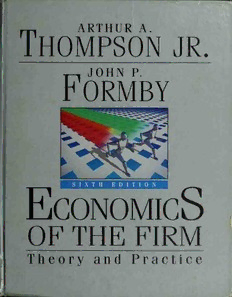
Economics of the firm: theory and practice PDF
Preview Economics of the firm: theory and practice
ARTHUR A. Thompson jr JOHN P. -P^ FORMBY SIXTH EDITION Economics OF THE FIRM Theory and Practice Economics firm of the Sixth Edition Economics Firm of the Theory AND Practice Arthur A. Thompson, Jr. John P. Formby The UniversilY ofAlabama Prentice Hall, Englewood Cliffs, New Jersey 07632 LibraryofCongressCalaloging-in-PublicationData Thompson.ArthurA. — Ecpo.nomcimc.softhefirm:theoryandpractice/ArthurA.Thompson.Jr..JohnP.Formby. 6thed. Includesindex. ISBN0-13-092867-4 1 Microeconomics. 2. Managerialeconomics. I. Formbv.JohnP.II. Title. II. Title. HBI72.T.'i8 1993 338.5-dc20 92-33351 CIP Editorial/productionsiipervi^ion: KristinE. Dackow Designsupervisor: PalWosczyk Interiordesign:ChristineGheringWolf Coverdesign:JayneConte Coverart: WestLight/B-50©OrionPress*lll Prepressbuyer:TrudyPisciotti Manufacturingbuyer: PatriceFraccio e 1993. 1989, 1985. 1981. 1977. 1973byArthurA.Thompson.Jr. PublishedbyPrentice-Hall,Inc. ASimon&SchusterCompany Allrightsreserved. Nopartofthisbookmaybe reproduced,inanyformorbyanymeans, withoutpermissioninwritingfromthepublisher. PrintedintheUnitedStatesofAmerica 10 9 8 7 6 5 4 3 2 1 ISBN D-13-mEab7-M Prentice-HallInternational(UK)Limited,London Prentice-HallofAustraliaPty. Limited,Sydney Prentice-HallCanadaInc.. Toronto Prentice-HallHispanoamericana,S.A.,Mexico Prentice-HallofIndiaPrivateLimited,NewDelhi Prentice-HallofJapan, Inc., Tokyo Prentice-HallofSoutheastAsiaPie. Ltd.,Singapore EditoraPrentice-HalldoBrasil. Llda.,RiodeJaneiro Contents Preface xvii Note to the Student xxiii Chapter 1 Introduction to Microeconomic Analysis i What is Microeconomics? The Methods of Economic Analysis 2 The Scientific Method Approach to Developing Economic Theories and Constructing Models ofEconomic Behavior. Must Economic Analysis Always Be Scientific? How Economists Explain—Some Alternati—ves to the Scientific Method. The Methods ofEconomic Analysis Where Things Now Stand. What Is aTheory? The Realism ofAssumptions. Applications Capsule: theWizard whooversimplified: a Fable Key Points 15 Chapter 2 Buyers, Sellers, Firms, andMarkets 18 What Is a Market? Why Do Firms Exist? How A Market Functions: The Model of Demand and Supply 22 Market Demand and Demand Curves. Market Supply and Supply Curves. Determining the Market Price. How Big Is a Market? 27 What Kinds of Markets Are There? 28 The Firm and the Marketplace 29 The Importance ofa Firm's Strategy. vi Contents Applications Capsule: kelloggsStrategy inthe ready-to-Eat Cereals Business The Concept of"The Firm" Revisited. Key Points 32 Chapter 3 BuyerDemand: The Cardinal UtilityModel 35 The Concept of Utility 36 Total Utility Functions 37 The Concept of Marginal Utility 39 Mathematical Capsule 1: Determiningthe PointofDiminishing Marginal Utility andtheSaturation Rate: An Applicationofthe MathematicalConceptsof Maxima andMinima Utility Functions forRelated Products. Consumer Behavior in the Marketplace 46 Mathematical Capsule 2: determining marginal utilityfor MULTIPRODUCTTOTAL UTILITY FUNCTIONS Some Simphfying Assumptions. The Utility-Maximizing Search. The Conditions for Utility Maximization. Cardinal Utility. The Law of Demand, and Consumer Surplus 51 The Concept ofConsumers" Surplus. Mathematical Capsule 3: determinationofthe Utility-MaximizingCombination ofProductsSubjecttoan Income Constraint How Realistic is this Model of Buyer Demand? 56 Applications Capsule: airline pricingstrategiesandConsumers' Surplus The Impact of Advertising on Buyer Utility and Buyer Demand 59 Applications Capsule: HowadvertisingCan Influence Consumer Demand Key Points 61 Chapter 4 BuyerDemand: TheLsdifference CurveandAttribute Models 66 The Concept of Indifference Curves 66 The Shapes of Indifference Curves 69 Four Characteristics of Indifference Curves 70 The Marginal Rate of Substitution 72
